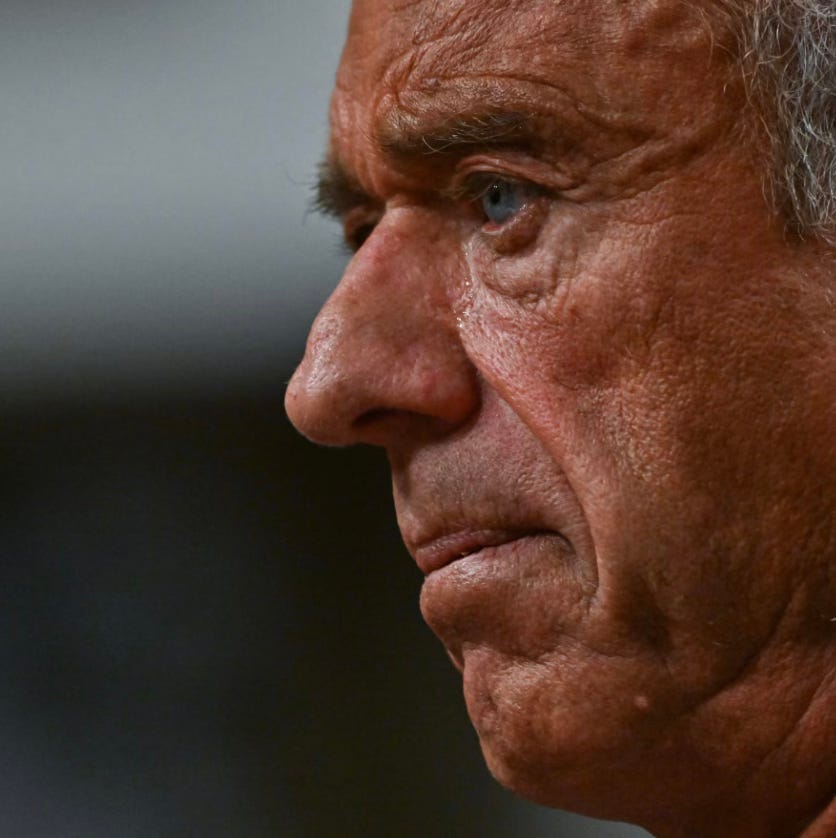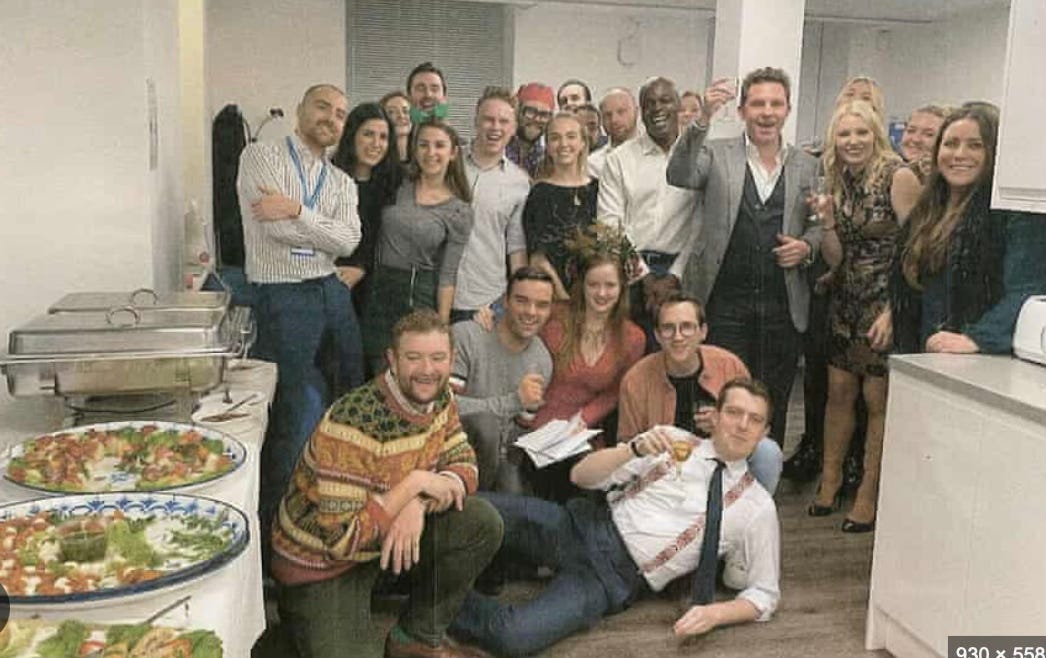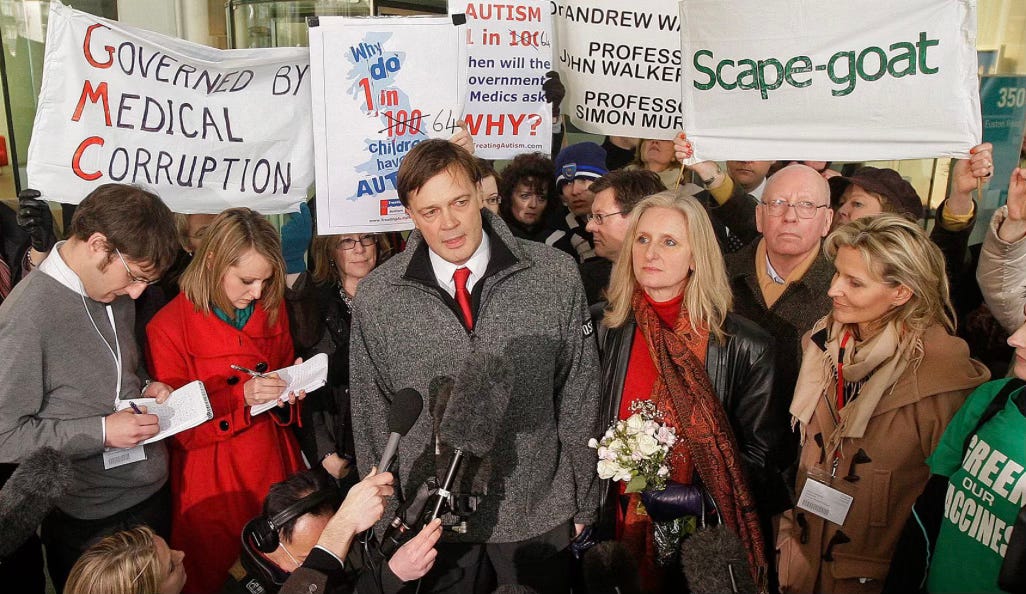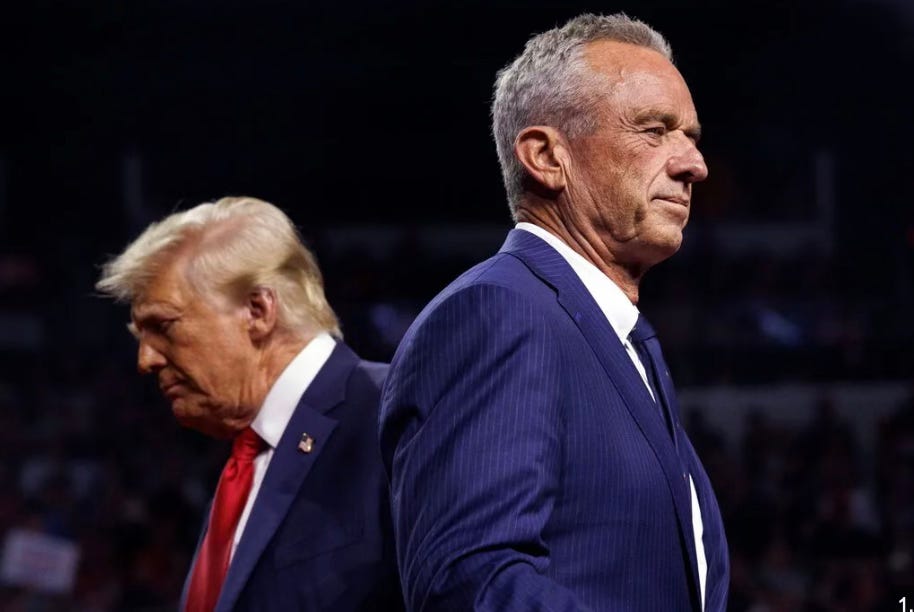Brain Worms in High Office: RFK Jr., Reform UK, and the Death of Public Health
A baby has died of whooping cough in Britain (The Guardian, 2025a). Earlier this year, another child died of measles (iNews, 2025). Both were preventable deaths - illnesses once consigned to the medical dustbin of history, brought back by something far more insidious than bacteria or viruses: distrust.
The statistics speak with a cold clarity. According to the UK government, almost one in five children starting primary school this year are not fully protected against several serious diseases (Gov.uk, 2025). Uptake of routine childhood immunisations has slipped year after year, leaving cracks in the wall of herd immunity. The results are now measured not just in percentages, but in funerals.
The erosion of vaccine confidence is not a sudden event but a long unravelling. Parents are not refusing injections on a whim. Many lived through the chaos of the Covid-19 pandemic - the rushed rollout of new mRNA vaccines, the constantly shifting advice from ministers, the sense that the state was demanding obedience but not offering honesty. Distrust was not born in the margins of conspiracy forums; it was seeded in Downing Street press conferences and watered by official contradictions.
That does not excuse vaccine hesitancy, but it does give context. Fear and betrayal are fertile soil. When parents feel they cannot trust the government, even life-saving interventions begin to look like state experiments. And the price is paid not in parliamentary approval ratings but in the smallest coffins.
The tragedy is that Britain has been here before. The ghost of Andrew Wakefield’s MMR scandal still lingers: a disgraced doctor whose fraudulent claims in the late 1990s shattered parental confidence, fuelling measles outbreaks that reverberate to this day (Godlee, Smith and Marcovitch, 2011; BBC, 2021). Now, as Britain mourns children lost to diseases once easily preventable, Wakefield’s spiritual heirs have taken centre stage across the Atlantic. In the United States, Robert F. Kennedy Jr. - anti-vaccine crusader turned Secretary of Health - has been given the authority to shape public health policy (The Guardian, 2025b). The consequences of that appointment will not stop at America’s borders.
Distrust spreads faster than measles, and in the age of social media, borders are no protection. What is incubated in Washington today can infect Westminster tomorrow.
The Roots of Hesitancy
Vaccine hesitancy in Britain today did not spring fully formed from Facebook memes or Telegram groups. Its roots lie deeper, tangled in a wider collapse of trust in institutions; a collapse gleefully accelerated by the Conservative Party.
When the first Covid-19 vaccines appeared in late 2020, they arrived at unprecedented speed. This was both a scientific triumph and a public-relations disaster. Ministers reassured the nation that the vaccines were safe and effective, while in the same breath admitting that no one could really know the long-term effects of a technology so new. To a public already cynical about politics, that sounded less like reassurance than hedging. People were asked to believe, instantly, in an mRNA process they had never heard of six months before.
Distrust thrives in such contradictions. The government lurched from lockdowns to reopenings, from mask mandates to personal responsibility, from clapping NHS workers to quietly underfunding the service all over again. At every turn, it looked less like public health and more like political management. Confidence, once lost, does not return with a press release.
And then came the Partygate scandal. If there was ever a moment that shattered the fragile contract between people and state, it was that. While ordinary families watched funerals over livestreams, Number 10 was awash with wine, laughter and contempt. For those already wavering about how serious Covid was, Partygate didn’t just look like hypocrisy, but proof. Proof that the rules were never really about saving lives but about keeping the public in line. Proof that while people lost their loved ones, Johnson and his cronies were too busy getting pissed to care.
This was Tory scum business at its most grotesque. They had already been lining their pockets with ‘VIP lanes’ for PPE contracts, handing multi-million-pound deals to friends and donors (NAO, 2020). Now they were mocking the very sacrifices they demanded from the public. With politicians who had proven themselves a shower of utterly self-serving liars, why would anyone entrust their health - and the health of their precious children - to them? Into that gap of doubt poured the anti-vaxxers, the conspiracy grifters, and the pipelines of disinformation. What began as hesitation quickly widened into a chasm, and it is in that chasm that measles, whooping cough, and death have returned.
Our own earlier work on Plague Island warned of this creeping collapse of authority. In writing about Kennedy’s conspiracism and the eugenics undertones of his autism claims, we argued that the most dangerous lies are those that grow in the cracks left by official deception (Plague Island, 2025; Plague Island, 2024). The pandemic did not create mistrust - it revealed how little trust there was left to begin with.
The result is a population primed for doubt. Into this vacuum step the grifters, conspiracy merchants, and political opportunists. In Britain, that lineage begins with Andrew Wakefield. In America, it continues with Robert F. Kennedy Jr. sitting behind the Secretary of Health’s desk.
The Ghost of Wakefield
Before Robert F. Kennedy Jr, before Covid, before the avalanche of Telegram conspiracies, Britain had already lived through its own public-health betrayal. His name was Andrew Wakefield.
In 1998, Wakefield published a paper in The Lancet falsely linking the MMR vaccine to autism. It was a fraud - a deliberate, calculated lie. Investigations later showed he had manipulated evidence, concealed financial conflicts of interest, and abused his position as a doctor for personal gain (Godlee, Smith and Marcovitch, 2011). For this he was struck off the medical register, disgraced, and declared unfit to practise.
But the damage was already done. MMR vaccination rates collapsed. Parents were left in anguish, wondering whether protecting their children from measles might doom them to autism. Politicians equivocated. Journalists amplified fear. And the virus crept back through the cracks. Britain saw measles return in outbreaks that should never have happened, costing lives and sowing a distrust that never truly healed (BBC, 2021).
Wakefield should have been a cautionary tale. Instead, he became a prophet for the anti-vaccine movement. When Britain finally closed its doors to him, he found fertile ground in the United States, where Trump’s America embraced him as a truth-teller (The Guardian, 2018). Today, he is still peddling the same old lies as gospel, recast not as fraud but as revelation.
It is impossible to overstate the poison Wakefield introduced into the bloodstream of public life. He taught a generation of parents to doubt. He taught opportunists that fear sells. And he built the template for the conspiracy pipelines that would later carry Kennedy to prominence: wrap a lie in pseudo-science, flatter parental anxiety, and present yourself as the lone truth-teller against the establishment. The ghost of Wakefield still stalks Britain’s hospitals every time a measles case rolls through the ward.
The tragedy is that the lesson was never learned. Wakefield’s fraud was exposed, but the seed he planted was allowed to grow. Almost 30 years later, the fruit is bitter: falling vaccination rates, grieving parents, and a political climate in which conspiracy theorists sit in the corridors of power. Wakefield lit the fuse. Kennedy is carrying the torch.
Enter RFK Jr.: From Fringe to Power
If Andrew Wakefield was the ghost, Robert F. Kennedy Jr. is the resurrection. Once dismissed as a crank on the fringes of American politics, Kennedy has now ascended to one of the most powerful health posts in the world: United States Secretary of Health. The anti-vaccine movement no longer shouts from the sidelines; it literally walks in the corridors of power.
Kennedy’s public career was never supposed to end like this. Scion of America’s most famous political dynasty, he began as an environmental lawyer, a defender of rivers and landscapes. But somewhere along the way the rivers ran dry, and he drifted into conspiratorial swamps. Vaccines, he declared, were poisoning children. Autism, he claimed, was the result of shadowy pharmaceutical plots. And now, in his official role, he can dress those fantasies up as policy.
Recently, Kennedy gave us a glimpse of the worldview he plans to impose. “I’m looking at kids as I walk through the airports today, as I walk down the street, and I see these kids that are just overburdened with mitochondrial challenges, with inflammation. You can tell from their faces, from their body movements, and from their lack of social connection. And I know that that’s not how our children are supposed to look” (The Guardian, 2025b).
What exactly is it he sees? Children warped by some invisible toxin, visible only to the enlightened eye of Robert F. Kennedy Jr? It is a grotesque mix of pseudo-medical jargon and spiritual clairvoyance, the ramblings of a man convinced he alone sees the sickness of the world. We might well ask: what does he see when he looks in the mirror? Kennedy does not radiate health - he looks gaunt, haunted, aged beyond his years. If he is what ‘healthy’ looks like, then God help us all. The brain worms have not been kind.
Our earlier work on Plague Island dissected the pseudo-scientific undercurrents of Kennedy’s rhetoric, pointing to the eugenic echoes in his autism discourse and the conspiratorial ecosystems that buoyed his rise (Plague Island, 2025; Plague Island, 2024). What makes this moment different - and infinitely more dangerous - is that Kennedy is no longer a fringe crank with a podcast. He is the man in charge of America’s health apparatus.
This is not merely a personnel change in Washington. It is a paradigm shift. For decades, the fight was to keep bad science out of policy. Now the bad science is the policy. For every parent in Britain scrolling late at night through Facebook or YouTube, wondering whether to trust the NHS, Kennedy’s voice carries across the Atlantic like vindication: See? Even the Americans think vaccines are dangerous.
Kennedy’s appointment sends a chilling message: the conspiracy theorists aren’t banging on the gates anymore - they’ve been handed the keys, and their conspiracies are burning a hole in the heart of the world’s most powerful democracy.
MAHA-MAGA: Trump, RFK Jr, and the Politics of Distrust
The alliance between Donald Trump and Robert F. Kennedy Jr is a grotesque marriage of convenience. On the one hand, a twice-impeached, twice-indicted demagogue whose career has thrived on grievance and lies. On the other, a once-respected environmental lawyer turned anti-vax crusader, now appointed to oversee the very health system he has spent decades undermining. Together they are MAHA-MAGA (Make America Healthy Again-Make America Great Again) - a supercharged fusion of Trumpian authoritarianism and conspiratorial pseudoscience (Washington Post, 2025).
For Trump, Kennedy is useful cover. He offers a sheen of ‘bipartisanship,’ proof that Trump can reach beyond the Republican base, even as he drags America deeper into the authoritarian abyss. For Kennedy, Trump offers something he has always craved: legitimacy. Years of being written off as a crank vanish when you’re sworn in as Secretary of Health. Kennedy no longer needs to shout from the fringe because he has been elevated to the very pinnacle of policymaking. And crucially, his conspiratorial thinking chimes perfectly with the MAGA base: a movement built on suspicion of institutions, disdain for experts, and the conviction that ‘they’ are lying to ‘us.’ Kennedy speaks their language, and now he speaks it with authority due to his political position within the Trump administration.
But this alliance is about more than optics; it is about power. Trump’s project has always been to dismantle the guardrails of American democracy, replacing expertise with loyalty and facts with feelings. Kennedy’s conspiratorial worldview fits this agenda perfectly. Science becomes just another opinion. Public health becomes a political weapon. The CDC is not a centre of disease control, but another agency to be bent into submission.
Not everyone is buying it. Bernie Sanders has already called for Kennedy’s resignation, warning that putting a man with such a record in charge of health policy is a reckless insult to science and public safety (New York Times, 2025). But Trump is not looking for competence; he is looking for devotion. In Kennedy, he has found a useful zealot - someone willing to launder pseudoscience into state doctrine, and to do so with the Kennedy name as a shield.
This is what makes the moment so dangerous. Trump has always thrived on distrust: “fake news,” “deep state,” “enemy of the people.” By elevating Kennedy, he doesn’t just weaponise that distrust against political rivals; he points it at vaccines, medicine, and the very idea of public health itself. In America, that will mean more outbreaks, more unnecessary deaths. But the ripple effects will not stop there. In the age of globalised information, when America sneezes, Britain catches the cold.
Transatlantic Ripples: Britain’s Vulnerability
What happens in Washington never stays in Washington. American politics is viral, and Britain has always been a willing host. Fox News talking points become GB News segments within days; Republican dog-whistles are repackaged as Reform UK slogans by the weekend. It is no different with vaccines.
Kennedy’s conspiratorial thinking does not stop at the US border. His books, speeches, and viral clips have been circulating in British socials for years. His pseudo-medical ramblings about autism, “mitochondrial challenges,” and “inflammation” are translated online into easy memes: Don’t trust the jab. They’re lying to you. For parents already primed by the ghosts of Andrew Wakefield and poisoned by the mistrust of Partygate, Kennedy’s elevation to US Secretary of Health hits home.
The danger here is not abstract. In Britain, vaccination uptake is collapsing. Almost one in five children starting school are not fully immunised against serious diseases (Gov.uk, 2025). A baby has already died of whooping cough this year. Another child died of measles (iNews, 2025; The Guardian, 2025a). These are not theoretical debates. They are tiny coffins in the ground. And yet, the more public health authorities urge calm, the more the sceptics dig in.
Britain is peculiarly vulnerable to this transatlantic contagion. Decades of austerity have left the NHS threadbare, creating the perception - sometimes justified - that government healthcare cannot be trusted. Brexit was sold on slogans of “taking back control,” and that anti-establishment mood has never truly gone away. Into that climate, Kennedy’s rhetoric fits perfectly: distrust the experts, question the system, look for the hidden hand.
This is why MAHA-MAGA matters for Britain. Trump weaponises distrust, Kennedy sanctifies it, and the echoes bounce across the Atlantic. When the American health secretary questions vaccines, it doesn’t just embolden anti-vaxxers in Texas or Florida. It reassures doubters in Sunderland, Southampton, and Swansea that their suspicions are not fringe, but mainstream.
Here lies the political danger. Reform UK, forever sniffing out populist talking points, will not resist for long. They have already borrowed Trump’s playbook on immigration and Brexit betrayal. It is only a matter of time before they parrot MAHA-MAGA logic on vaccines. Imagine Farage, standing before a rally, declaring: They betrayed you about Brexit. They lied to you about lockdown. Why trust them on vaccines? The line practically writes itself.
Once that seed is planted, Britain risks following America down the same ruinous path, where preventable diseases return, not because medicine failed, but because politics poisoned trust.
Reform UK and the Coming Bandwagon
If there is one thing Reform UK understands, it is how to identify and weaponise anger. Farage has made a career out of turning grievance into votes - first with Europe, then with immigration, now with whatever sells on the front pages of the right-wing press. Anti-vaccine rhetoric is not yet central to Reform’s agenda, but make no mistake: it soon will be.
The logic is irresistible. The MAHA-MAGA alliance has already normalised conspiratorial thinking at the highest levels of American government (Washington Post, 2025). Vaccine scepticism is no longer the preserve of Facebook groups and Telegram cranks because it sits in the office of the United States. For a party like Reform, forever chasing the populist zeitgeist, this is blood in the water.
Britain is primed for it. After Partygate, the PPE scandal, and years of austerity hollowing out the NHS, trust in government health messaging is paper-thin. All Reform needs to do is join the dots: They lied to you about Brexit. They lied to you about lockdown. Why should you trust them with your children’s health?
And here is the grim truth: the line will work. Reform doesn’t need to win a debate about mRNA technology or herd immunity; it just needs to seed doubt. Once doubt exists, the conspiracy pipelines take over. Parents up at night on Facebook, YouTube and X; trawling TikTok clips of Kennedy and Wakefield, will find Reform’s rhetoric waiting for them like an old friend.
The political payoff is obvious. Position yourself as the only party willing to ‘ask questions,’ and suddenly vaccine hesitancy becomes not a public health crisis but an electoral strategy. Reform will not care about the consequences: dead children, grieving families, overwhelmed hospitals. They never have. Populism is not about solutions; it is about rage. And vaccines, tragically, are fertile ground for that.
When Reform finally jumps on the bandwagon, Britain will have completed the circle. From Wakefield’s fraud to Kennedy’s promotion to Trump’s MAHA-MAGA alliance, the transatlantic contagion will have fully taken root. What began as a lie in a Lancet paper will end as a populist rallying cry on a Birmingham street.
Our Own Argument: What We Said Before, and What We Say Now
We have been here before. On Plague Island, we have tracked Robert F. Kennedy Jr’s rise with a wary eye, and we warned of exactly this moment.
In ‘The Eugenics Revival,’ we highlighted how Kennedy’s autism rhetoric was not simply misinformed, but steeped in the same poisonous thinking that once underpinned eugenics movements - the idea that children who do not conform to some narrow vision of ‘health’ are damaged, lesser, or victims of shadowy elites (Plague Island, 2025). In ‘Robert F. Kennedy Jr.: Conspiracy and Controversy,’ we mapped the networks that propelled him - the podcasts, the online forums, the moneyed enablers - all helping to repackage pseudo-science as populist truth (Plague Island, 2024).
At the time, these warnings may have seemed like dispatches from the margins. Kennedy was still dismissed by most commentators as a crackpot, the tragic heir of a famous family chasing notoriety in the age of clickbait. But now the crackpot sits in the chair of the US Secretary of Health, and what was once fringe has been mainstreamed into the bloodstream of American power.
This is the danger we identified: the convergence of conspiracy and legitimacy. Kennedy’s frauds and fantasies are no longer peddled in the shadows; they carry the seal of government. The same man who claimed to see “mitochondrial challenges” written on children’s faces (The Guardian, 2025) now signs off on America’s public health strategy. The line between evidence and delusion has not only blurred, but been erased.
And the UK is not immune. As we previously said, mistrust grows in the cracks left by official deception. The PPE scandal, Partygate, years of austerity all created those cracks. Now Kennedy’s conspiracism, sanctified by his office, pours into them like water through broken masonry. The edifice of public trust is crumbling, just as we warned it would.
So, what do we say now? That this is not just about Kennedy, or Trump, or even Reform. It is about the conditions that allow lies to thrive: political corruption, media cynicism, and the utter failure of governments to take responsibility for the distrust they create. Until those conditions are confronted, we will continue to bury children for diseases that should have been left in the past.
Conclusion: The Epidemic of Distrust
The whooping cough baby, the measles child - these are not isolated tragedies. They are the harvest of seeds sown long ago: by Andrew Wakefield’s fraudulent paper, by Tory profiteers with their ‘VIP lanes’ and lockdown soirées, by ministers who demanded sacrifice while laughing behind closed doors. Every act of betrayal chipped away at public trust, until all that remained was fertile soil for lies.
Into that soil stepped Robert F. Kennedy Jr., the great redeemer of paranoia, now seated at the helm of America’s health policy. His conspiratorial mutterings about “mitochondrial challenges” and poisoned children chime perfectly with a MAGA base trained to despise experts and worship grievance. And Trump, ever the opportunist, has made Kennedy his proof of bipartisanship - MAHA-MAGA’s sick joke: the union of authoritarian bluster and anti-vax zealotry.
But America’s contagions never stop at its shores. They wash up here, carried by algorithms, amplified by tabloids, waiting for a populist vessel. Reform UK has already shown itself willing to borrow from Trump’s hymn sheet on Brexit betrayal and immigration dog-whistles. Why wouldn’t they seize vaccine scepticism, too? Farage doesn’t actually need to win a scientific argument; he only needs to blow the dog whistle.
The bitter truth is this: Britain is not falling back into the grip of preventable diseases because medicine has failed. It is happening because politics has. Because when Wakefield lied, the state hesitated. When Johnson lied, the state covered its ears. And now, when Kennedy lies, the state has promoted him. The viruses were not the deceivers. The politicians were.
So here we are: a twenty-first-century world with MRI scanners, cancer breakthroughs, and space telescopes, yet digging graves for measles and whooping cough like it’s 1899. This is not the return of old diseases; it is the return of old failures.
This is the epidemic of distrust. And unlike measles, there will be no vaccine for it.
If you value this kind of writing, please consider subscribing to Plague Island.
We don’t hide our work behind a paywall, because we want it to be read. But if you can support it, we’ll use that support to keep writing more, and writing better.
Paid subscribers receive early access, behind-the-scenes newsletters, and the chance to shape future essays.
We write with rigour, we cite everything, and we answer only to our readers.
Or, please support us with a one-off tip → Buy Me a Coffee
References
BBC (2021) ‘The origins of one of the biggest frauds in the world’ (22 October). Available at: https://www.bbc.co.uk/reel/video/p09zhlch/the-origins-of-one-of-the-biggest-frauds-in-the-world- [Accessed: 31 August 2025].
Godlee, F., Smith, J. and Marcovitch, H. (2011) ‘Wakefield’s article linking MMR vaccine and autism was fraudulent’, British Medical Journal, 342, p. c7452. doi:10.1136/bmj.c7452.
Gov.uk (2025) ‘Almost 1 in 5 children starting primary school are not fully protected against several serious diseases’ (29 August). Available at: https://www.gov.uk/government/news/almost-1-in-5-children-starting-primary-school-are-not-fully-protected-against-several-serious-diseases [Accessed: 31 August 2025].
iNews (2025) ‘Worrying stats as whooping cough vaccine uptake falls and baby dies.’ Available at: https://inews.co.uk/news/health/worrying-stats-whooping-cough-vaccine-uptake-baby-dies-3889795 (Accessed: 31 August 2025).
The Guardian (2018) ‘How disgraced anti-vaxxer Andrew Wakefield was embraced by Trump’s America’ (18 July). Available at: https://www.theguardian.com/society/2018/jul/18/how-disgraced-anti-vaxxer-andrew-wakefield-was-embraced-by-trumps-america [Accessed: 31 August 2025].
The Guardian (2022) ‘Timeline of Boris Johnson’s Partygate scandal.’ Available at: https://www.theguardian.com/politics/2022/jan/31/partygate-timeline-key-events (Accessed: 31 August 2025).
The Guardian (2025a) ‘British baby dies from whooping cough as vaccination rates fall’ (31 August). Available at: https://www.theguardian.com/society/2025/aug/31/british-baby-dies-from-whooping-cough-as-vaccination-rates-fall [Accessed: 31 August 2025].
The Guardian (2025b) ‘RFK Jr health claims as CDC leadership questioned’ (29 August). Available at: https://www.theguardian.com/us-news/2025/aug/29/rfk-jr-health-claims-cdc-leadership [Accessed: 31 August 2025].
National Audit Office (2020) ‘Investigation into government procurement during the Covid-19 pandemic’ (26 November). Available at: https://www.nao.org.uk/reports/investigation-into-government-procurement-during-the-covid-19-pandemic/ [Accessed: 31 August 2025].
Plague Island (2024) ‘Robert F. Kennedy Jr: Conspiracy, Controversy, and the Future of Public Health in America’ (30 December). Available at: https://www.plagueisland.com/p/robert-f-kennedy-jr-conspiracy-controversy [Accessed: 31 August 2025].
Plague Island (2025) ‘The Eugenics Revival: RFK Jr, Autism Lies, and the Death of Compassion’ (17 April). Available at: https://www.plagueisland.com/p/the-eugenics-revival-rfk-jr-autism [Accessed: 31 August 2025].







